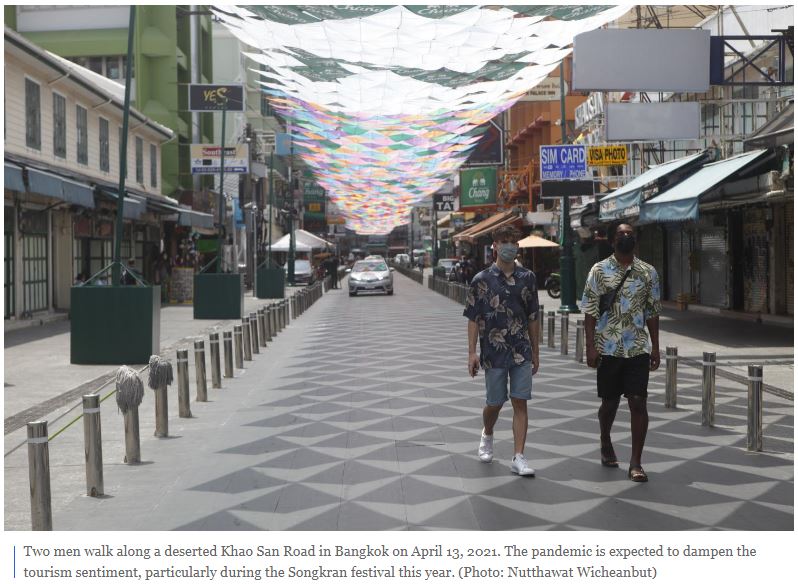Thailand: Will Songkran be a washout?
The Thai New Year festival of Songkran is recognised as the most important annual event in the country, similar to Golden Week in China and Japan when a torrent of people are expected to hit the road for a long holiday.
Prior to the pandemic, the festival was a golden opportunity for everyone in the supply chain as local tourists flocked to provinces or took trips abroad, while international guests flooded in to experience the unique water celebrations.
However, this year’s April festival is expected to be another dry one as Thailand faces an upward wave in the Omicron variant, which is forecast to peak in March.
Some tourism operators anticipate a similar situation as happened in Europe, where the curve rapidly rose and fell within a month, giving them hope of a revival in time for the holiday.
However, there is a slim chance the country will see a large influx of travellers as in the past because there is not enough time to build up travel sentiment, particularly when regulatory hiccups and health concerns remain obstacles.
DRY SONGKRAN
“We should not hope for international visitors during Songkran,” said Sisdivachr Cheewarattanaporn, president of the Association of Thai Travel Agents.
“Assuming we can contain the virus flare-ups by March, the number of guests will not be greater than 5,000-6,000 per day, which was the average for the Test & Go period.”
He said if there were fewer travel restrictions, such as no requirement for an RT-PCR test before arrival, the number might escalate to 10,000 per day, but would still not be able to fill the shortfall for the whole industry.
“Plenty of hotels remain closed as demand from foreigners is not strong. The reopening the past few months might help resuscitate the industry, but most of us cannot return to the levels of the pre-pandemic period,” said Mr Sisdivachr.
He said at the meeting between tourism operators and Public Health Minister Anutin Charnvirakul on Tuesday, the government agreed to cancel the second RT-PCR test on the fifth day for inbound arrivals, but dismissed the proposal to scrap two tests — a test 72 hours prior to arrival and a test upon arrival.
The government also insisted the Thailand Pass registration system would remain, despite growing complaints from tourists and the private sector.
Mr Sisdivachr said the coming months would be difficult as the infection curve in Thailand just started to pick up, unlike many nations in Europe that have already lifted most restrictions.
He said even though most locals are vaccinated and the Omicron threat is less lethal than previous strains, caseloads will test the resilience of public health authorities.
There is no commitment or guarantee Thailand will effectively curb the virus and relax all restrictions in time for Songkran, said Mr Sisdivachr.
ADDITIONAL COST
Chotechuang Soorangura, managing director of NS Travel and Tours, said while many outbound tour operators tried to capitalise on the upcoming holiday by offering tour packages to Europe, where there are minimal entry requirements, demand is limited to those who are willing to pay for the extra costs.
He said the hefty price tag largely stemmed from health screening measures for the Test & Go scheme. Two nights in a standard hotel room with two RT-PCR tests costs at least 6,000-7,000 baht.
The RT-PCR test alone is around 2,500-3,000 baht per test, which is more expensive than in Europe, priced at less than 1,000 baht.
“Overseas trips would require travellers to pay at least 10,000 baht extra,” said Mr Chotechuang.
“Potential tourists are more likely those who don’t have budget concerns, as the average length of each trip is longer and the tour fare is more expensive.”
Due to such requirements in Thailand, Thai travellers who usually took several outbound trips per year have squeezed their plans to just one long trip to make those additional expenses worthwhile, he said.
Mr Chotechuang said the inconsistent regulations were also delaying a tourism recovery as travellers are not confident about the impact of any changes that are suddenly made before or while they are travelling.
RACE AGAINST TIME
He said this year’s Songkran festival may be the first in two years when outbound tour operators can restart their services.
However, they have to rely on the viral situation in March, as Thailand needs to see a downward trend before hoping for any tourism revival.
“We are climbing to a steep peak,” Mr Chotechuang said. “If we’re lucky we should see a downtrend within three weeks like other countries. Tour operators will have to wrap up their package sales in just one or two weeks before the Songkran holiday.”
He said it’s still doubtful in practical terms, as airlines require tour companies who book advanced tickets to confirm passenger names 15 days prior to departure.
Without early bookings from guests, they may not be able to hold those seats planned for Songkran.
Moreover, most travellers, even those who have the luxury of time and money, are worried about health and safety, particularly in destinations that have reported high numbers of infections.
“Travellers during the pandemic will look for destinations that require no mandatory quarantine, have a reliable public health environment and reasonable prices,” said Mr Chotechuang. “They will put off international trips if they are uncomfortable with health and safety in destinations and flip-flopping regulations that could abruptly affect their plans.”
Source: https://www.bangkokpost.com/business/2268991/will-songkran-be-a-washout-


 English
English




